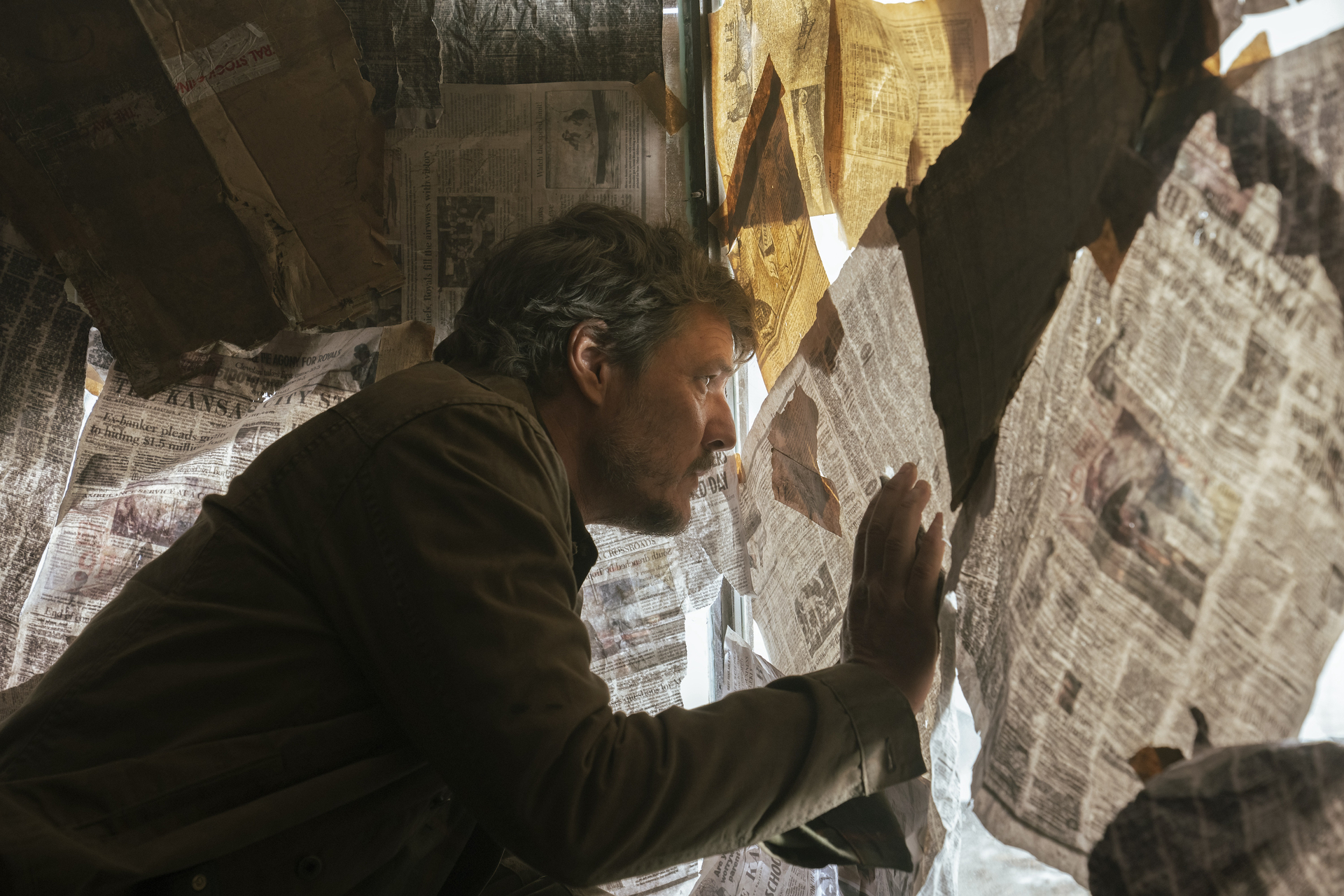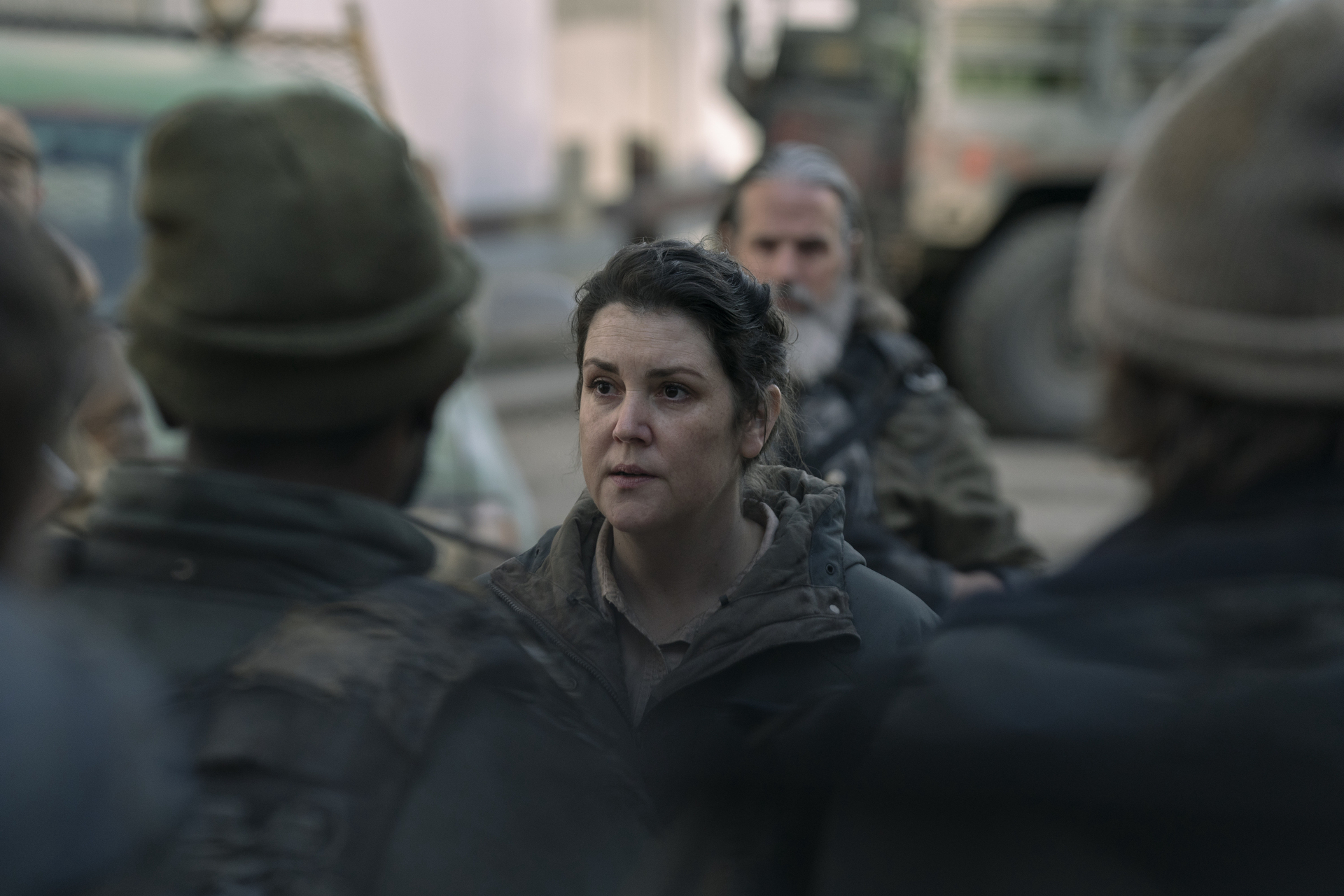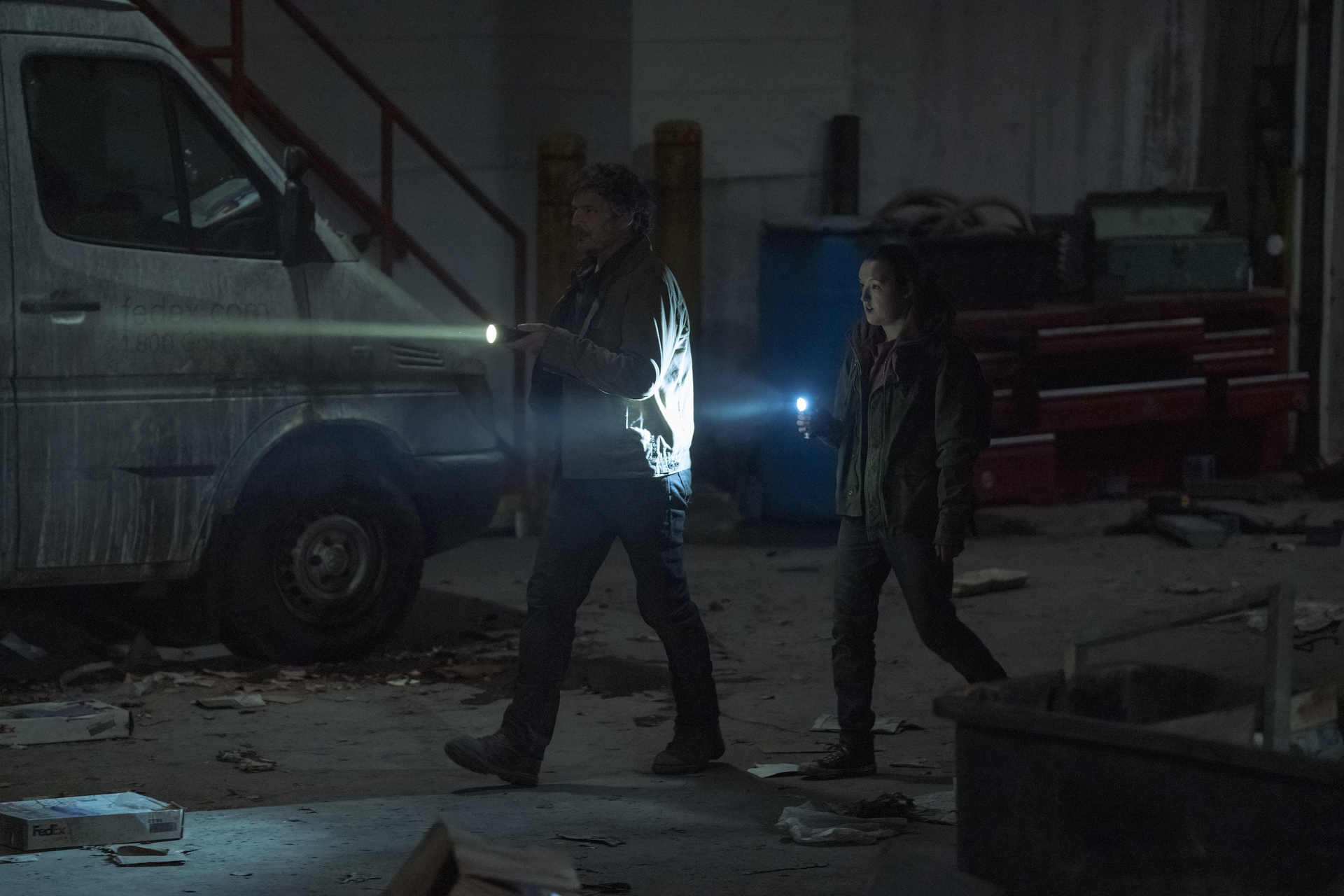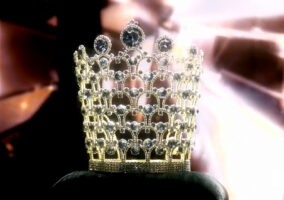
In this episode, Joel and Ellie head out into the world after leaving the idyll of Bill and Frank’s compound and run into the biggest, baddest threat of them all: other people. The Last of Us has managed to distinguish itself from other apocalyptic tales in its first few episodes by focusing more on humanity than monsters, more on world-building than violence. This has been to the show’s enormous benefit, as evidenced by the overwhelmingly positive (and in many cases, pleasantly surprised) responses to last week’s tear-jerker of an episode. But the thing about setting your story in a post-apocalyptic world is that eventually you’re going to have to deal with how shitty other people can be when society breaks down. In many ways, this episode felt like the show entering very familiar, some might even say cliched territory, and while we won’t deny that it was a bit of a comedown after last week’s emotional interlude, we think writers Craig Mazin and Neil Druckmann, along with director Jeremy Webb infused this episode with enough world-building, character-defining and nuance to make all of the gunplay and violence feel like something of an afterthought. In other words, Joel and Ellie run into some dangerous people, but the script, directing and acting all go to enormous lengths to suggest that there are no real villains here.
We open with Ellie in a gas station bathroom playing with her newly acquired gun while Joel siphons gas. He helpfully explains that all standing tanks of gas are mostly water at this point,which is why they have to make so many stops for gas. He mentions how far they could go on a tank of gas in the Before Times and when she asked him where he went with all of that freedom, he says with a little regret “Pretty much nowhere.” One of the enormous benefits of making a child one of your two main characters in your apocalypse story is that it makes exposition and world-building so much easier and more natural. She doesn’t know how the world works now and has no exposure to what the world was like before, so everything needs to be explained to her and she responds to each new thing with wonder and delight. She unleashes a book of puns on him and while we think a lot of 14-year-olds in our world might find something like that hilarious for a minute or two, there’s something sweetly endearing about her complete lack of exposure to dumb, hacky comedy. One of the things the actors on this show are so good at is micro-expressions. Watch Pedro Pascal when she puns him for the first time. First, he is completely confused as to what’s going on (How many times has anyone made a pun in front of him in the last few years, let alone read one out loud from a book?) and then you can see him fighting the impulse to be amused by it.
In Bill’s truck, Ellie finds a gay porn magazine stuck under the seat and teases a clearly uncomfortable Joel. Another artifact from a past that seems like an alien world to her. You have to figure literally no one has the kind of supplement-fueled gym-sculpted body of your average circa 2000 gay porn model, which must make them look awfully freakish to a kid who’s never known a world where people could devote enormous time and energy into how they look. It’s fun to wonder whose magazine it was. Our first assumption was that it was Frank’s and that he used to go out to the garage for a little me time when Bill wasn’t around, but the more we think about it, the more we think it had to have been Bill’s. Where would Frank have gotten it from? It’s a holdover from Bill’s closeted, lonely days, we think. Joel explains that the roads are clear enough to drive on because the government put plows on enormous trucks to clear all of the cars out of the way for their tanks. She mentions that she wants to see a tank and he tells her that she will, along with other military vehicles and equipment, noting that FEDRA is “fighting the wrong enemy” and that they’re “scattered around now.” Details like this help fill in the world bit by bit. And while we can’t claim that this world isn’t dreary and demoralizing, not to mention exploitive and terrifying, we can’t help but think that any system is, if not better than the kind of anarchy The Walking Dead traded in for most of its run, at least slightly more hopeful about who people are and what they’re capable of. Granted, the system in place is fascistic and crumbling, but it’s a world where you can send messages across the country and even drive from one end of it to the other (theoretically), which makes it not quite so alien or hopeless to the viewer. It’s a world where the buffalo are still roaming and you can drive past them while you listen to Hank Williams singing “Alone and Forsaken.” There’s a sense that humanity could make a comeback some day, even if that day seems pretty far off. Ellie embodies that hope, and it permeates the entire philosophy of The Last of Us. This is why we don’t think it’s fair to dismiss this show as a retread of The Walking Dead, which was infused with an overwhelming pessimism about humanity from day one. Having said that, the landscape they drive through is one of devastation and despair, rotting amusement parks and collapsed bridges. Even Ellie is silenced by the sight of what was. It’s more of the world than she’s ever seen.

They pull into the woods for the night to camp and eat 20-year-old Chef Boyardee from a can. She has absolutely no table skills, shoveling food in her mouth like someone who never had a reason to eat any other way. She is, of course, delighted by two-decade-old canned ravioli. She asks if they can start a fire and he shoots it down. She thinks it’s because infected will see it but he notes that they’re not intelligent enough for that and besides, they’re too remote to have to worry about them, both of which are interesting details. It’s other people they have to worry about attracting. She asks if they’ll rob them and Joel says they’ll do much worse than that, which clearly unsettles her. She notes that her sleeping bag smells good. “Oh, that would be Frank’s, then.” We just love this little detail that Frank always smelled good. We wonder what cologne he made Bill pick up for him in his supply raids. Joel guesses the answer to one of her pun riddles (Why did the scarecrow get an award? Because he was outstanding in his field.), which prompts her to call him a dick and accuse him of reading her book, not realizing that she was throwing out some of the oldest, most-repeated jokes of the 20th century. In the dark, she asks about the people he referred to earlier and asks him to promise that no one will find them. It spooks him enough that he spends the night standing guard, even though he’s clearly exhausted. He’s this girl’s father now, whether he can accept it or not. He wouldn’t be the first father who came to his role reluctantly and resentfully.
The next morning, she’s revolted by the smell of coffee and asks if that’s what the Starbucks in the QZ used to sell. It’s honestly kind of hilarious that Starbucks survived the apocalypse, although the coffee trade is evidently not what it used to be. While reading the map locations aloud, she’s surprised at the pronunciation of Cheyenne. We love all of these thoughtful little details – some of them little more than asides – that fill in and support character and setting. Of course she wouldn’t know how to pronounce Cheyenne. She asks him about Tommy – pesters him, actually – and he tells her that his brother was what they used to call a joiner, and scoffs at his apparent lifelong desire to be a hero. After the outbreak, Tommy convinced him to join a group making their way to Boston, “mostly to keep an eye on him” and that’s where he met Tess. “That whole crew, well, for what it was, it worked,” he reminisces. We kinda want to see a flashback of this time, if only to get more Anna Torv. Anyway, Tommy eventually met Marlene and joined the Fireflies. Joel calls him delusional. “If you don’t think there’s hope for the world,” Ellie asks him, “Why bother going on?” “You haven’t seen the world, so you don’t know” he tells her. “You keep going for family,” he says after considering it for a second. When she notes that she’s not family he reminds her of what Marlene said of her: she’s cargo. “I made a promise to Tess and she was my family,” he explains. Remember that he was taken aback by her profession of love and her mention that she never expected him to reciprocate her feelings toward him, which makes us think he never once referred to Tess as family while she was alive.
As we noted in last week’s recap, part of the appeal of watching any post apocalypse story is to yell at the characters for doing dumb things that we the viewers would never do because our apocalypsing would be perfect. What sets The Last of Us apart from other shows of its type is that most of the characters we’re meeting – Joel, Tess, Marlene, Bill and Frank – aren’t the types to do dumb or reckless things, for a variety of reasons, which tends to make for a more satisfying watch. But this episode gave us the first “Joel, what are you doing?” moment when they come upon a blocked overpass outside Kansas City, which Joel decides to go around by getting off the interstate, entering the city, and getting back on the interstate. Given his warnings about running into other people, this immediately struck us as a terrible idea. We could see him weighing the situation, so it’s not like he didn’t know the risks. He just thought he could beat them. Inside the city, they come upon an abandoned QZ checkpoint, prompting Ellie to ask “Where the fuck is FEDRA?”

No time to ponder what may have happened here, because they immediately get ambushed and their truck gets totaled. Even a moment like this is heavy with characters bits. Joel immediately tells Ellie to put on her seatbelt and, after they crash, immediately asks her if she’s alright. The paternal feelings are clearly increasing by the minute. Ellie is at first shocked that Joel wouldn’t help the man posing as injured and then later, somewhat fascinated (and not for the first time) when she watches Joel enact violence on someone. Joel takes out the ambushers, but one of them bursts through the rear door of the laundromat and overwhelms him. The guy tries to choke Joel out, all the while yelling about how he’s going to kill him. From her hiding spot, Ellie first takes out her knife but quickly upgrades to her gun before working up the nerve to shoot the guy. This might seem like an odd thing to say, but it was wonderful to see the guy immediately burst into tears and beg for his life (“It’s okay! We’re not fighting anymore! I’ll go home and tell everyone that you’re good! We’re friends! I didn’t know!”), all the way up to the end. It might be easy to kill random NPCs in a game, but in a television show trying for nuance, it should be as difficult and emotionally devastating as it is in real life. For a show about the zombie apicalypse, The Last of Us is decidedly not down with senseless violence. Joel tells her to look away while he kills the guy. He doesn’t seem to want to do it, but he never truly wavers over the question. It’s a kill-or-be-killed world out there and Ellie is learning that most difficult of lessons. “I’m okay. I’m good,” she immediately assures Joel. Again, it really says something about how far their relationship has progressed that Joel is equally as concerned with Ellie’s mental well-being as he is with her physical safety – and that both of them know this and acknowledge it. This girl is no cargo.
Unfortunately, they just inserted themselves into some sort of gangland war situation. We meet Melanie Lynskey as Kathleen, the leader of an independent militia that now evidently controls the city after having driven out or killed the FEDRA presence. Once again, the show delivers on its casting. Anyone who’s paid any attention to Lynskey’s work in recent years knows that she’s in her sweet spot when she plays a relatable, next-door-neighbor type of character who has clearly been pushed way bound her moral and ethical boundaries. As she questions the old doctor who pleads for his life by reminding her that he delivered her, she refers to a brother who was beaten and killed by FEDRA troops and implies that the doctor was a quisling who ratted him and other members of the community out. When he protests that FEDRA held a gun to his head, she does the same. “Have I satisfied the necessary conditions to get you to talk?” It’s just difficult to listen to Melanie Lynskey deliver a threat and see her as a bad person, which is, we think, the entire point of her casting in this role. Think about all of the militia or gang leaders you’ve encountered in stories or games like this one. Not one of them sounded like a harried daycare worker when they ordered their troops to find and kill people. We know she’s a danger to Joel and Ellie, but we want to believe that she’s just a good person who’s been pushed too far. She’s looking for a man named Henry, who she blames for her brother’s death. When the bodies of the men Joel killed are discovered and brought to her, she leaps to the conclusion that Henry hired some mercenaries. Briefly, she considers letting the doctor out of his cell to tend to the men, but when it becomes clear that they can’t be saved, she marches right up to the holding cell and puts a bullet in his head. She orders her soldiers to find every collaborator and “kill them all,” in her sweet, high-pitched voice. Like so many of the characters on this show, we are dying to know who she is and how she got to this point. It’s interesting how the show unpacks the different ways an event like this changes people. Bill probably wasn’t a very nice person prior to the outbreak and Kathleen almost certainly wasn’t a murderous militia leader. As Kathleen’s soldiers go on raids through the city, it’s interesting to see how occupied it is; not the pit of zombies most cities tend to be depicted as on shows like this. Evidently, the infected have been cleared out and people live in this somewhat uneasy compound without any presence from whatever the federal government is. “They’re not FEDRA and they’re not fireflies, who are they?” Ellie asks. “People,” Joel responds darkly. They hole up in an abandoned bar while the raids go on and he expresses a considerable amount of regret that she was forced to shoot someone and had to watch him kill the guy. She asks him if he’s okay and for a second, it’s clear that he doesn’t know how to answer that, partially because he’s not okay and partially because no one ever asks him if he’s okay. He apologizes to her for getting her in a position where she had to shoot someone. “It wasn’t my first time,” she confesses. He gives her a quick lesson on how to handle and fire the gun and gives it back to her. She’s an eager learner and clearly thrilled to finally have her own gun. They make plans to their way to a tall building nearby so they can climb to the top and figure out a way out of the city.”We’ll get through this,” he tells her. “I know,” she says quietly, giving the impression that she knows he needed to hear that from her more than she needed to hear that from him.

Kathleen’s lieutenant takes her to an abandoned building, where a child has evidently been hiding out. She mentions that “Henry won’t let Sam starve” and orders continuous surveillance of the situation. Her lieutenant then takes her to the basement, where the floor has seemingly collapsed. When something shifts under the rubble, she yells “Fuck!” and runs out. She orders him to lock the room, tell no one about it, and continue their search for the elusive and apparently nefarious Henry. We suspect that decision is going to come back to bite her ass sooner rather than later Meanwhile, as they make their way up forty floors to find a vantage point, Ellie asks Joel how he knew that the guy asking for help earlier was actually planning on ambushing them. “I’ve been on both sides,” he tells her uneasily. “It was a long time ago, we did what we needed to survive,” referring to Tess, Tommy, and the group they traveled with. “Did you kill innocent people?” she asks him. He doesn’t answer. He doesn’t have to. He puts down a bunch of broken glass as an alarm system. She questions if he’ll be able to hear it and mentions that she’s noticed a hearing loss in his right ear. You have to be paying seriously close attention to someone to notice someone like that. He asks her what she meant when she said it wasn’t her first time hurting someone and for once, she’s the one who shuts him down. “I don’t want to talk about it.” He respects her stance, but reminds her that she shouldn’t have had to do what she did at her age. “So you’re saying it gets easier when you get older?” “No. Not really.” She tries one more pun on Joel: “Did you know that diarrhea is hereditary? It runs in your jeans.” He finally gives in and rewards her with a laugh, adding, “That’s so goddamn stupid.” After a day of high danger and stomach-churning violence, they laugh themselves to sleep in the dark, only to wake up to the aforementioned Henry and Sam pointing guns on them. It never ends.
RUPAUL’S DRAG RACE: Old Friends Gold Next Post:
Grammys 2023: Beyoncé in Gucci
Please review our Community Guidelines before posting a comment. Thank you!



